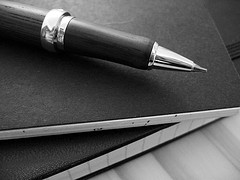Teacher reflections
By Mary Bigelow
Posted on 2015-01-24
 When I was student teaching, we had to do a “reflection journal.” Now that I have my own teaching assignment, I’m wondering if teachers keep such a document. If so, what do they put in it? What format do they use and how do they find the time for journaling? —L., Vermont
When I was student teaching, we had to do a “reflection journal.” Now that I have my own teaching assignment, I’m wondering if teachers keep such a document. If so, what do they put in it? What format do they use and how do they find the time for journaling? —L., Vermont
Teachers are constantly thinking about their lessons: What went well? What should I do differently next time? How did students react? Unless a teacher is given a tightly scripted lesson with no variations allowed, there is always room for improvement or extension.
Reflection goes beyond edits to a lesson, however. It is a more intense and purposeful professional activity, a form of self-evaluation during which teachers analyze their practices and the effects on student learning or classroom behaviors. If you ask teachers if they reflect on their teaching, you’ll get a general consensus that they do, but the timeframe, format, and content of this reflection varies.
Teachers find time for this in different ways. Some set aside quiet time every day to think about what happened. For others, their thoughts may happen more informally or spontaneously. (I did a lot of thinking on the commute home.) If you teach the same lesson several times a day, you have a chance for some immediate fine-tuning before the next class appears. As teachers prepare lessons, they consider how the previous lessons relate to the new one. Even grading tests, projects, or lab reports provides time to think about what students did (or did not) learn.
Some teachers try to rely on mental reflections, but in the course of the day, our memories can get overloaded. Putting thoughts in writing is good, even if it’s just a few words. Some of our colleagues may keep a written diary or journal with their thoughts and reflections. Others use sticky notes on a printed lesson plan, sidebars or edits in electronic documents, blogs, or notes in a calendar app to record their thoughts and insights.
The process of reflecting is more important than the format of the document or the time of day in which it is done. I’ve found it helpful to think of reflection as being formative or summative.
Formative reflection is the just-in-time thinking on a current lesson or unit, based on student feedback from exit tickets, formative evaluations, and your own observations. Here are some guiding questions for this level of reflection:
- Did students meet the instructional goals? What evidence do I have?
- How did students engage with the lesson? What kinds of participation did I observe?
- What should I do differently? Do I need additional resources or support for this lesson?
- Did anything unanticipated happen? What was the impact on learning?
- Did the lessons have an effective combination of science content, practices, and cross cutting concepts?
Summative reflection at the end of a unit or at the end of the semester/school year is an opportunity to look back from several perspectives and to create an action plan for the future.
From the students’ perspective:
- What strategies did I use to connect with students? Are there new strategies I would like to try next year?
- Did students seem to enjoy learning? How do I know?
- What was my greatest student success story?
- What did students seem to struggle with?
From an instructional perspective:
- What was my greatest eye-opener this year?
- Should I change the amount of time or emphasis on some topics?
- How effective were the classroom and laboratory management routines and procedures?
- What are the gaps in my own knowledge base?
- How well was I able to access and use the available technologies?
- What kinds of interdisciplinary connections did I make?
From an assessment perspective:
- How well do grades reflect student learning?
- How well did the assessments align with the unit goals and lesson objectives?
- Did I provide opportunities for students to reflect on their own learning (e.g., through a science notebook, rubrics)?
- Based on assessment data, what topics or instructional strategies should I change or keep?
A colleague recently posted this reflection on Facebook: Today was a good day. My [seventh] graders recognized the beauty and awesomeness of mitosis—I wish I could jar that feeling. I wish you could have seen it. As I reflected back on my seventh grade classes, I recognized that excitement!
For more on reflections, check out the insights some of our science education colleagues have shared on the Do You Reflect? thread of the Evaluation and Assessment discussion forum in the NSTA Learning Center.
In addition, I’ve created an NSTA Resource Collection on Reflection as a Professional Activity with additional ideas.
Photo: https://flic.kr/p/8iAzC
Disclaimer: The views expressed in this blog post are those of the author(s) and do not necessarily reflect the official position of the National Science Teaching Association (NSTA).


